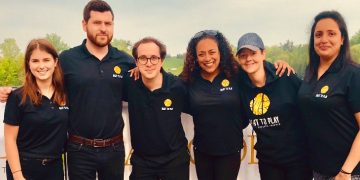Martin Barnard the CEO of Golf Canada Foundation
Martin Barnard works in the world of sport philanthropy – a place where you can blend your passion for sport, business and giving back. As the leader of a national foundation, Martin reminds us the power of having a vision and the importance of being flexible. As most of us who’ve worked in (or with) the nonprofit sector know, change is constant. Being able to adapt and manage new situations while working towards your goals is both an integral skill and a crucial quality for leaders. I first met Martin when we were working together at Right To Play and can attest to his uncanny ability to do just that- and calmly. It’s just one of Martin’s qualities that make him a wonderful leader and mentor.
Describe your job in a nutshell?
It’s very entrepreneurial. As a small foundation partnered with a big sport association, we have access to some terrific resources and a donor base with a deep passion for the sport. The challenge is figuring out how to engage people at the right level, how to communicate impact whether a donation is for $50 or $5,000, and how to pitch sport as a part of an overall giving strategy. We’re never going to replace health charities or community donations and nor should we, but we can shape and impact children, health, and the environment in a meaningful way over time.
Describe the moment you first realized you wanted to work in impact?
I had worked with athletes, coaches and agents for over 10 years. With nonprofits, these people understand they’re in a privileged place in society and have decided to use their position of influence to help others in a number of different ways. It’s a great combination of the excitement of sport with the appeal of giving back.
How did you get your current job and how did your previous work / life experience prepare you for a career in social impact?
I was recruited into this job. The preparation for social impact is largely about developing relationships, and creating partnerships that have value for both sides. Lasting social impact is really the same idea, you’re just measuring the outcomes differently.
What skills, qualities or competencies do you think are important to be a good leader of a foundation?
Diplomacy, flexibility, and passion come to mind. Most foundations are fairly small and rely on volunteers through boards, events, and donor recruitment. So if you have a strong vision that can adjust as needed with current trends people passionate about the cause will join in.
What advice do you have for people looking for social impact jobs?
Think about building skill sets over time, and don’t worry too much about holding out for a particular cause. People get too hung up on wanting to work in a particular sector when in a year or two they might be able to improve their resume or build partnerships that will last through many positions. That includes potentially going back to for-profit with the right opportunity with an eye to how it will transfer back to non-profit.
Think about building skill sets over time, and don’t worry too much about holding out for a particular cause.
What do you think? Do you agree with Martin about the importance of building skill sets over time? Or do you think you should hold out for the cause you’re most passionate about?
Want more curated content delivered straight to your inbox?
Follow us on twitter @b_meaningful and like us on Facebook







No Comment